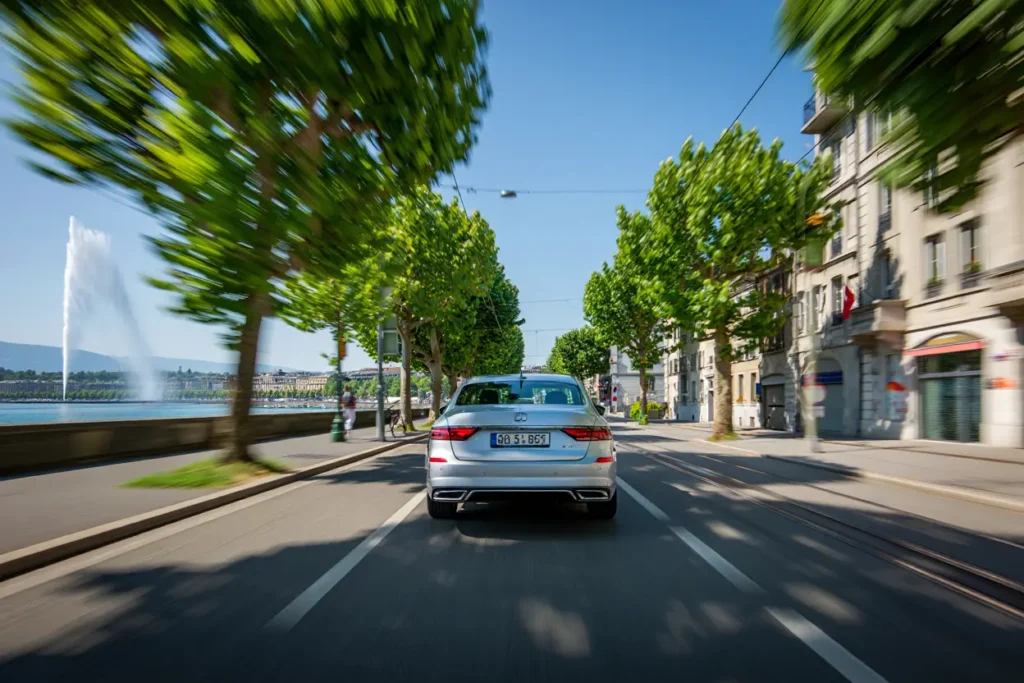Want to apply for a driving license in Geneva? Obtaining a driver’s license in Switzerland – and more specifically in Geneva – requires following a well-defined path. From applying for a learner’s permit to actually obtaining one, there are several compulsory stages: theoretical and practical training, and administrative formalities. This article explains in detail how to apply for a driving license in Geneva (car category B and motorcycle categories A1 and A), the age requirements, the documents required, the time and costs involved.
The information published on this blog is provided for information purposes only. Its accuracy, completeness or timeliness is not guaranteed. It does not constitute professional advice (legal, medical, financial or otherwise). The author declines all responsibility for their use. For all important decisions, please consult a qualified professional.

How do I apply for a driver’s license in Geneva?
To obtain a Swiss driver’s license, there are several steps to follow. In Geneva, here are the essential steps to successfully apply for your driver’s license:
- Take a first-aid course – Compulsory for any driver’s license application, this course (also known as a rescue course) lasts around 10 hours. It must be taken with an approved organization and is valid for 6 years. Only a few cases (such as small category M scooters) are exempt.
- Take an eye test – A vision test is required when applying for a driving license. It must be carried out by an approved optician or ophthalmologist. The certificate, valid for 24 months, must be enclosed with the application.
- Filling in the application form – Each canton has its own official form for applying for a driver’s license. In Geneva, it’s available online or at the offices of the Office cantonal des véhicules (OCV). Fill it in carefully and attach: visual certificate, recent passport photo, copy of ID (and residence permit for foreigners).
- Submitting your application to the CVO – Once you’ve completed the form and gathered all your documents, you must submit your driver’s license application in person to the CVO. If the application is complete, you will be allowed to register for the theory test. Some applications can also be submitted online.
- Passing the theory test – Once your driver’s license application has been validated, you can take the theory test (MCQ on the Swiss highway code). If you pass, the OCV will issue you with a learner’s permit, authorizing you to learn to drive with an authorized companion.
- Learner’s driving and compulsory courses – With a learner ‘s permit, you can begin accompanied driving or take courses at a driving school. For cars, the awareness course (8 h) is compulsory; for motorcycles, the basic course (12 h). These courses must be passed before the practical test.
- Taking the practical test – The final stage in the application for a driving license, this test assesses your ability to drive independently. Registration is via the OCV. If you pass, you’ll receive a trial driving license valid for 3 years.
- Obtaining a full driving license – During the probationary period, you must complete a two-phase training course. Once this period has elapsed and the courses have been validated, you can apply to the OCV to exchange it for a full driver’s license.
Each stage of the process is important and compulsory. L’Auto-École Lémanique can guide you through each of them, whether to help you fill in the administrative forms, train you effectively for the theory test or prepare you for the practical test under real-life conditions.
What are the eligibility criteria for applying for a driver’s license?
Before you start, make sure you meet the requirements for obtaining a Swiss driver’s license:
- Minimum age: You need to be at least 17 to apply for a learner’s permit (category B). Since 2021, young people can start driving accompanied from the age of 17, but must practice at least 12 months before taking the practical test if they are not yet 20. For motorcycles, the minimum age is 16 for category A1 (light motorcycles up to 125 cm³) and 18 for category A limited (motorcycles up to 35 kW). (See next section for details of motorcycle categories).
- Residence in Switzerland: You must be legally resident in Switzerland (have an official address in a canton) to apply for a driving license. Non-residents cannot obtain a learner’s permit in Switzerland.
- Identity papers: You must be in possession of a valid identity document (passport or Swiss identity card, or residence permit for foreigners). If you are a minor (under 18), parental authorization will generally be required at the time of registration.
- Physical fitness: For ordinary licenses (car, motorcycle), a medical examination is not required a priori. Only certain professional licenses (cat. C trucks, cat. D buses) require a medical examination. However, you must have sufficient corrected eyesight (an eye test is compulsory, as explained above) and be fit to drive. In the case of special medical conditions, the OCV may request a medical opinion.
These criteria ensure that only eligible applicants begin the process. If you meet all the requirements, you can gather your documents and submit your driver’s license application with confidence.

What are the differences between a car licence (category B) and a motorcycle licence (categories A1, A)?
The main stages (theory, practice, trial licence) are similar for a car or motorcycle licence, but there are some important differences between categories B (car) and A1/A (motorcycle):
- Category B – Car: Applicants aged 17 and over can apply for a driving license (learner’s permit) for cars weighing up to 3,500 kg. After passing the theory test, the candidate must practice driving for at least 12 months if under 20. The 8-hour awareness course is compulsory before the practical test. The practical test, conducted by anOCV expert, lasts 45 to 60 minutes. If successful, a 3-year trial license is issued, followed by the full license after the two-phase training.
- Category A1 – Light motorcycles: Driving license application possible from age 15 for mopeds (max 50 cm³ / 45 km/h) and from age 16 for motorcycles up to 125 cm³ (max 11 kW). The initial stages are similar (first aid course, sight test, theory). Once the A1 motorcycle learner’s permit has been obtained, the 12-hour basic motorcycle course is compulsory within 4 months. This course teaches the basics of motorcycle driving. The practical test assesses handling, emergency braking and driving in traffic. If you already have a B license, the A1 procedure can be simplified.
- Category A – Motorcycle: Accessible from age 18 via an application for a driving license for a powerful motorcycle, but with initial restrictions. Applicants start with an A license limited to 35 kW for 2 years. After this period, with no serious infringements, they can move up to unlimited category A via an additional practical test. The 12-hour basic motorcycle course is also required from the outset. The practical test (limited or unlimited) is more demanding, with specific technical maneuvers. A gradual move up to large-displacement motorcycles is mandatory to guarantee safety.
In addition to these differences, please note that motorcycle driving licenses require appropriate equipment (approved helmet, gloves, etc.) for lessons and tests. Auto-École Lémanique offers tailor-made training courses for cars and motorcycles, taking into account these particularities: we have specialized motorcycle instructors.
How long does it take to get a license?
The length of the procedure may vary according to your situation and availability, but here are some guidelines for Geneva :
- Administrative deadlines: once you have submitted your application for a learner’s permit to the OCV, it generally takes 1 to 2 weeks to receive your learner’s permit by post (unless there are complications with the application).
- Validity of the learner’s permit: once issued, the learner’s permit is valid for a maximum of 24 months (2 years). You must pass your theory and practical tests within this period, or you will have to reapply. (Since 2021, passed theory tests no longer expire, but are valid indefinitely as long as the learner’s permit remains valid).
- Training time: preparation for the practical test depends on the individual. It is advisable to take sufficient driving lessons and practice regularly. In Switzerland, the average number of practical lessons before passing the test is often between 20 and 30 hours of actual driving, spread over several months. With AEL, you can plan your driving lessons at your own pace (e.g. 1-2 times a week over several months).
- Waiting for the practical test: there may be a delay in obtaining a practical test date from the CVO. In Geneva, the waiting time can be around 1 month or more, depending on how busy it is. It is therefore advisable to book your date as soon as you feel ready, bearing in mind that if necessary your instructor can adjust the date (by agreement with the CVO, a change of appointment is possible up to 96 hours in advance).
- Probationary license: after passing the practical test, the probationary license lasts for 3 years. During this period, you will be required to take the second-phase course (one day). You have up to 3 years in which to do this, but ideally you should do it within the first year of obtaining your license, so as to reap the benefits quickly. The final license will be granted at the end of the 3-year period if all the conditions are met.
In short, a well-prepared student can obtain his or her driving licence in just a few months (for example, by starting theory at 17, and taking the practical test at 18 once the minimum practical year has been completed). However, given the training required and the time available, you should generally allow 6 to 12 months between the start of the first aid course and the successful practical test. A good tip is to plan each step in advance to avoid delays (book the first-aid course, register for the theory exam as soon as it’s ready, etc.).

Why take your driving test in Geneva with AEL?
Auto-École Lémanique (AEL) is a Geneva-based driving school renowned for the quality of its teaching and personalized support. Choosing AEL for your training offers many advantages:
- Comprehensive training: AEL offers all the necessary courses under one roof: classroom theory courses, awareness courses, basic motorcycle courses, and of course practical driving lessons in manual or automatic cars. You benefit from consistent support throughout your training.
- Experienced instructors: Our instructors are canton-approved professionals with years of experience. Pedagogical and patient, they adapt to your pace and help you overcome your apprehensions. Whether you’re a complete beginner or a driver with some practice under your belt, we adjust our teaching to maximize your progress.
- Administrative support: Geneva’s administrative procedures (exam registrations, trial license management, etc.) can seem complex – AEL supports you in this too. We can advise you on how to set up your file for theOCV, the deadlines to be met (e.g. reminder to take the 2nd phase course), and remain available for any questions you may have about the formalities.
- High success rate: Choosing AEL means putting the odds in your favor. Our driving school boasts a remarkable exam success rate thanks to our rigorous approach. Based on feedback from our students, we’re proud to have one of the best reputations in Geneva – as evidenced by an average rating of 4.9/5 out of over 800 Google reviews left by our satisfied students! Your success is our priority, and we do everything we can to make sure you get your license right first time.
- Flexibility and personalized follow-up: AEL adapts to your schedule. Our courses and lessons can be programmed online, with an extended timetable from Monday to Saturday. What’s more, we provide personalized follow-up for each student: regular progress reviews, targeted advice on your weak points, and the possibility of mock exams to boost your confidence.
- Knowledge of Geneva’s terrain: Passing your driving test in Geneva has its own specificities (dense urban traffic, bilingual signs, 30 km/h zones, etc.). Our instructors, who know theOCV test routes inside out, will train you on typical routes and situations typical of Geneva traffic. You’ll approach the practical test on familiar ground, calm and prepared to handle any situation.
In short, Auto-École Lémanique offers you professional, caring and effective guidance to help you obtain your driving license in the best possible conditions and apply for your driving license. The measure of our success is yours: hundreds of new drivers trained by AEL are now driving safely in Geneva and elsewhere, and recommending our school!
Conclusion
Applying for a driving license in Geneva is a process that is accessible to everyone, provided they are well informed and accompanied. From first aid to the practical test, every step counts in the training of a responsible driver. By following the steps carefully – and taking advantage of the support of a trusted driving school like AEL – you’ll put all the chances on your side to get it right the first time.
At Auto-École Lémanique, we’re committed to making your journey as smooth as possible and helping you apply for your driving license. Don’t hesitate to contact us with any questions you may have, or to sign up for our courses: our team will be delighted to guide you step by step towards success. By choosing AEL, you’re opting for peace of mind and the assurance of quality training, from the highway code to independent driving. Ready to get behind the wheel? 🚗 Contact us today and get on the road to success with AEL!





